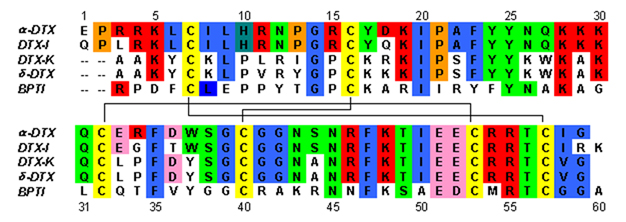Dendrotoxins are a class of presynaptic neurotoxins produced by mamba snakes (Dendroaspis) that block particular subtypes of voltage-gated potassium channels in neurons, thereby enhancing the release of acetylcholine at neuromuscular junctions. Because of their high potency and selectivity for potassium channels, dendrotoxins have proven to be extremely useful as pharmacological tools for studying the structure and function of these ion channel proteins.

Dendrotoxins have been shown to block particular subtypes of voltage-gated potassium (K+) channels in neuronal tissue.[1] In the nervous system, voltage-gated K+ channels control the excitability of nerves and muscles by controlling the resting membrane potential and by repolarizing the membrane during action potentials. Dendrotoxin has been shown to bind the nodes of Ranvier of motor neurons[2] and to block the activity of these potassium channels. In this way, dendrotoxins prolong the duration of action potentials and increase acetylcholine release at the neuromuscular junction, which may result in muscle hyperexcitability and convulsive symptoms.
- ^ Si, M.; Trosclair, Krystle; Hamilton, KA; Glasscock, E (2018-11-13). "Genetic ablation or pharmacological inhibition of Kv1.1 potassium channel subunits impairs atrial repolarization in mice". Am J Physiol Cell Physiol. 316: C154–C161. doi:10.1152/ajpcell.00335.2018. ISSN 0363-6143. PMC 6397341. PMID 30427720.
- ^ Gasparini S, Danse J-M, Licoq A, Pinkasfeld S, Zinn-Justin S, Young LC, C.L. de Medeiros C, Rowan EG, Harvey AL, and Me’nez A (1998). Delineation of the Functional Site of alpha-dendrotoxin: The functional topographies of dendrotoxins are different but share a conserved core with those of other KV1 potassium channel-blocking toxins. Journal of Biological Chemistry 273:25393-25403